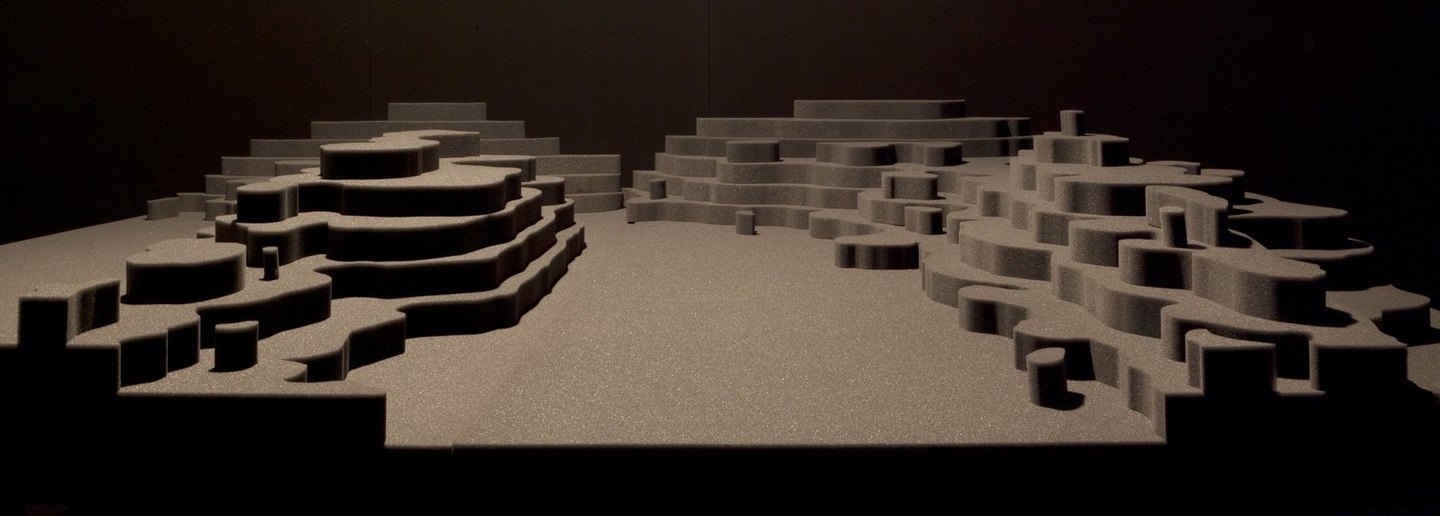SIDEBAR: Lawrence Abu Hamdan

SIDEBAR welcomes internationally renowned artist Lawrence Abu Hamdan, curator Omar Kholeif and scholar W.J.T Mitchell ( University of Chicago, Department of English) to the Gray Center Lab for a lecture and conversation exploring Abu Hamdan's work on the politics of listening and visuality. The discussion will center on Abu Hamdan's work as a "private ear," and his projects that deal with the intersection of politics and legality in the Middle East and abroad.
SIDEBAR is an ongoing conversation series organized by the Gray Center. Join us at 6:00pm for food and drinks as we settle into an evening of productive engagement with our invited guests.
Lawrence Abu Hamdan is an artist and audio investigator and currently a guest of the DAAD Artists-in-Berlin Program. Abu Hamdan’s interest in sound and its intersection with politics originates from his background as a touring musician and facilitator of DIY music. The artist's audio investigations have been used as evidence at the UK Asylum and Immigration Tribunal and as advocacy for organizations such as Amnesty International and Defence for Children International. The artist’s forensic audio investigations are conducted as part of his research for Forensic Architecture at Goldsmiths College London where he is also a PhD candidate.
Abu Hamdan's Rubber Coated Steel 2016 won the short film award at the Rotterdam International Film festival 2017 and his exhibition Earshot at Portikus Frankfurt (2016) was the recipient of the 2016 Nam June Paik Award. Other solo exhibitions include Taqiyya at Kunsthalle St Gallen (2015), Tape Echo (2013) at Beirut in Cairo and Van AbbeMuseum, Eindhoven, The Freedom Of Speech Itself (2012) at Showroom, London, The Whole Truth (2012) at Casco, Utrecht. Abu Hamdan is the author of the artist book [inaudible] : A Politics of Listening in 4 Acts and a forthcoming ebook produced as part of his 2015-17 fellowship at the Vera List Center for Art and Politics at the New School in New York. His works are part of collections at MoMA New York, Guggenheim New York, Van AbbeMuseum Eindhoven, Centre Pompidou and Tate Modern.
Dr. Omar Kholeif is a writer and curator whose work focuses on the intersection of art, global politics and emerging technologies.
Kholeif was the former Manilow Senior Curator and Director of Global Initiatives at the Museum of Contemporary Art Chicago. Previously, he was Curator at the Whitechapel Gallery, London; Senior Curator at Cornerhouse, Manchester; Curator at FACT, Liverpool; Head of Art and Technology at SPACE, London; Artistic Director of the Arab British Centre, London and founding Director of the UK’s Arab Film Festival. He has curated or co-curated numerous exhibitions, commissions and programs internationally, including Focus: Beyond Territory, Abu Dhabi Art (2017); Cyprus Pavilion, 56th Venice Biennale (2015); Abraaj Group Art Prize, Dubai (2015); Focus: Middle East, North Africa and the Mediterranean, Armory Show, New York (2015) and the Liverpool Biennial (2012).
Among his more than twenty edited or co-edited books are Electronic Superhighway (2016), The Rumors of the World: Re-thinking Trust in the Age of the Internet (2015), Moving Image (2015) and You Are Here: Art After the Internet (2014). Forthcoming single-authored books include The Artists Who Will Change the World and Goodbye World! Looking at Art After the Internet (both 2018). Kholeif holds MA degrees from the University of Glasgow and the Royal College of Art, London as well as a PhD from the University of Reading. He is a Churchill Fellow, a Fellow of the Royal Society of Arts and a member of AICA, International Association of Art Critics. In 2016, he was the Goldberg Visiting Professor at Hunter College, New York. He has served on numerous juries, including those for the Film London Jarman Award and the Thoma Foundation Arts Writing Award in Digital Art, and has won awards and grants from major organizations, most recently from the Graham Foundation for the Advanced Study of Fine Arts.
Born in Cairo, he currently lives and works in Chicago and London.
WJT Mitchell is one of the world's leading scholars on image culture. He teaches in both the English and the Art History departments at the University of Chicago, where he is Gaylord Donnelly Distinguished Service Professor. He is also the editor of the interdisciplinary journal, Critical Inquiry, a quarterly devoted to critical theory in the arts and human sciences. He works particularly on the history and theories of media, visual art, and literature, from the eighteenth century to the present. His work explores the relations of visual and verbal representations in culture and iconology (the study of images across the media). In addition to publications resulting from his own research, under his editorship, Critical Inquiry has published special issues on public art, psychoanalysis, pluralism, feminism, the sociology of literature, canons, race and identity, narrative, the politics of interpretation, postcolonial theory, and many other topics. As a teacher, he encourages students from a variety of disciplinary locations to think about such topics as: "Space, Place, and Landscape," "Fetishism, Totemism, Idolatry," "The Eye and the Gaze," "Violence and Representation," and "The Arts of Memory." In 2003, he received the University of Chicago's Faculty Award for Excellence in Graduate Teaching. His iconic books include, Seeing Through Race (Harvard, 2012), Cloning Terror: The War of Images, 9/11 to the Present (Chicago, 2011), What Do Pictures Want? Essays on the Lives and Loves of Images (Chicago, 2005), and The Last Dinosaur Book: The Life and Times of a Cultural Icon (Chicago, 1998).